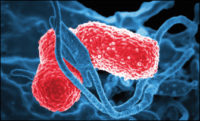Adults with normal thinking and memory skills who have trouble sleeping may be at greater risk for Alzheimer’s disease, a new study shows. Researchers asked 101 older people with genetic risk factors for the degenerative brain disease to complete a sleep questionnaire. Samples of participants’ spinal fluid revealed those reporting poor sleep quality had more biological markers of Alzheimer’s, including buildups and tangles of toxic proteins, such as beta-amyloid and tau, as well as brain-cell damage and inflammation, the New York Times reports. “Not everyone with sleep problems is destined to develop Alzheimer’s disease,” says study author Barbara Bendlin of the University of Wisconsin. “We’re looking at groups of people, and over the whole group we find the association of poor sleep with the markers of Alzheimer’s.” The precise link is unclear. Previous studies suggest the brain “cleans house” overnight, clearing out harmful toxins, and sleep loss could disrupt this protective process.
Related Posts
December 5, 2023
Vitamin C is Cancer’s Worst Adversary
Most people take Vitamin C to fend off a cold, but new research suggests it could also be a possible weapon in the fight against cancer. A team of researchers... continue reading
March 2, 2023
Why Bacteria Are Becoming Drug-Resistant
People suffering from bronchitis, flu, and other ailments often leave their doctor’s office with a prescription for antibiotics— even though in many cases... continue reading
January 17, 2023
The Chelation Miracle – EDTA & Cardio Advantage Plus
According to the Center for Disease Control and Prevention, cardiovascular disease, particularly heart attacks and strokes, are the number one disease killer... continue reading


